Storage
At this point, you've created a function and a website. Let's make things interesting by using object storage.
Creating the Storage¶
First, navigate to Storage in the side menu and click the + button.
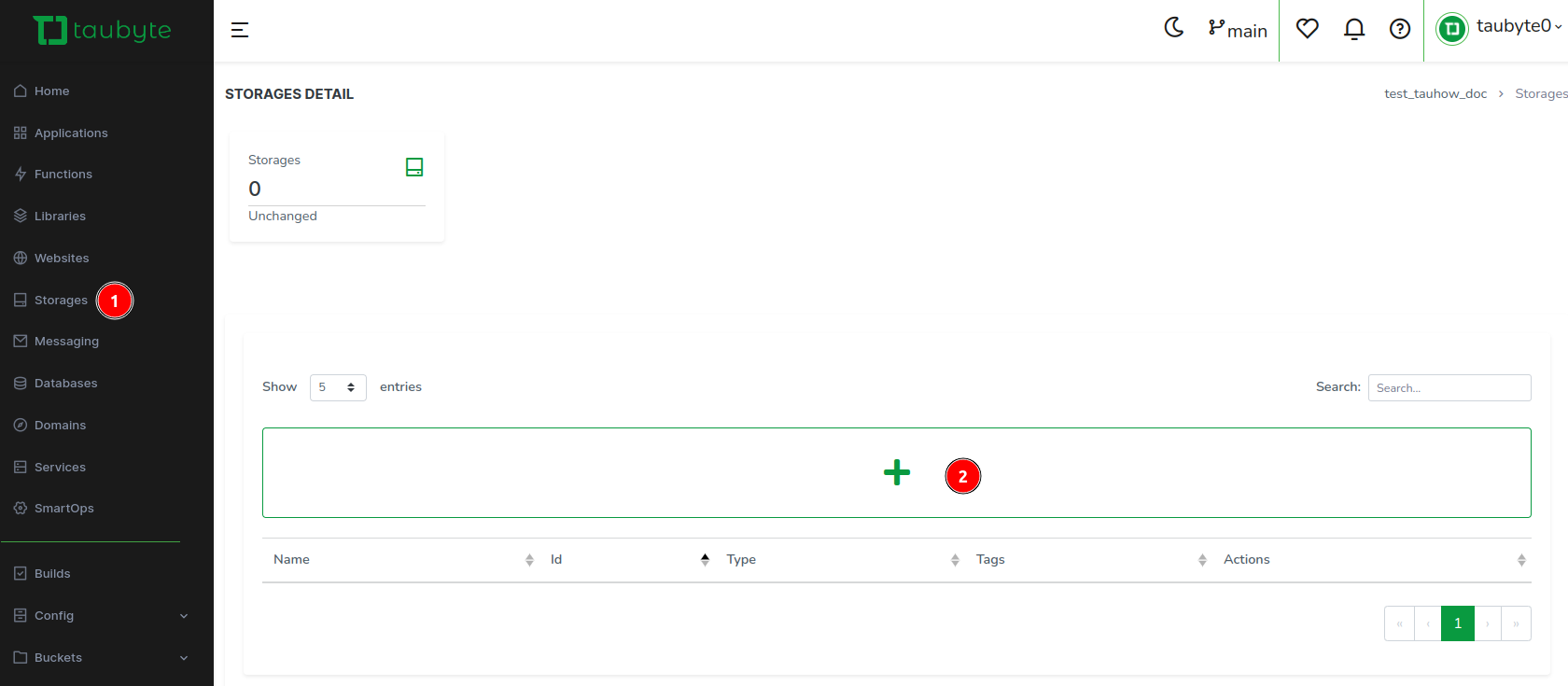
Name the storage simple_storage. As a matcher, use /simple/storage. Ensure the type is set to Object Bucket and the size to 1GB.
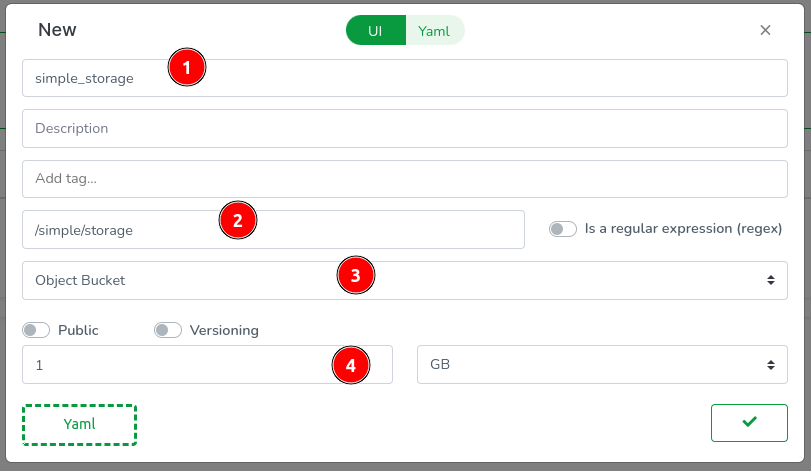
💡 Note: The matcher can be any string and even a regular expression. I prefer to use a path like
/simple/storageto make it easier to identify the storage.
Validate to create the storage configuration.
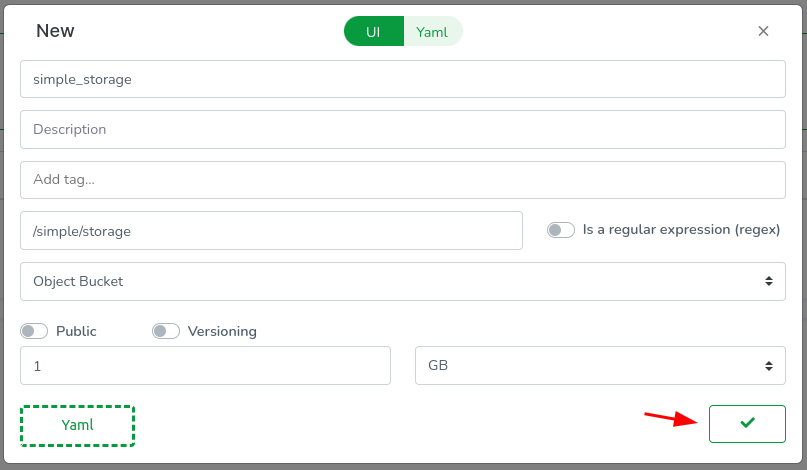
Now, you should see your new storage in the list.

Remember, this configuration only exists in the local copy of the repository stored in the browser's virtual file system. To push the changes to the remote repository, click on the push button at the bottom right corner. Review the changes, add a commit message, and click on Push.

Use the Storage¶
Unlike S3 storage, Taubyte storage is instantiated on the fly when you first use it. This is why you can use regular expressions as a matcher. For example, if we used /profile/storage/[^/]+, opening /profile/storage/userA would create a bucket just for that user. Most importantly, as of today, it's only accessible from your code. To access it through an HTTP endpoint, you'll need to create a function.
Let's create two functions that will use the storage: one to upload a file and another to download a file. For detailed steps on how to create a function, see Create a function.
Upload a File¶
Start with the upload function. Go to Functions and click on the + button. Create a new function named store_file. Ensure it has enough memory for your files; here, we're going for 100MB. Set the method to POST, use the generated domain, set the path to /api/store, and set the entry point to store.
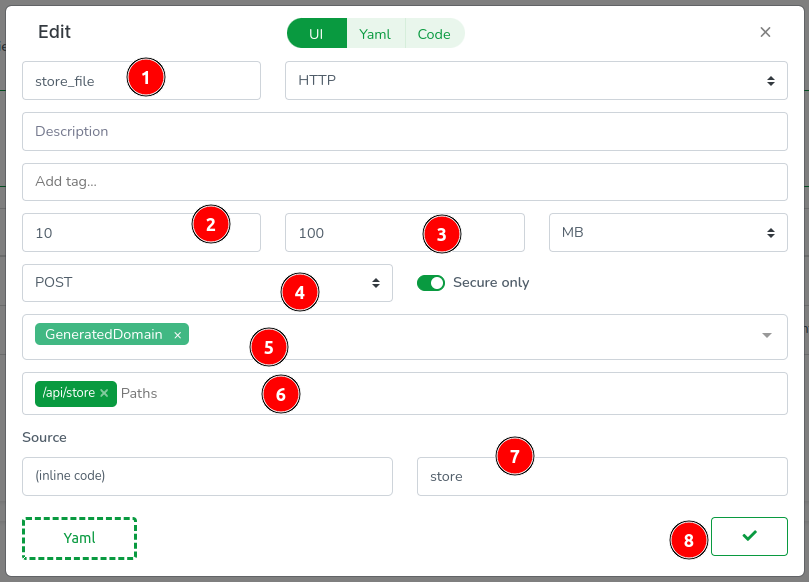
Switch to the code view and add the following code:
package lib
import (
"encoding/json"
"github.com/taubyte/go-sdk/event"
http "github.com/taubyte/go-sdk/http/event"
"github.com/taubyte/go-sdk/storage"
)
func failed(h http.Event, err error, code int) uint32 {
h.Write([]byte(err.Error()))
h.Return(code)
return 1
}
type Req struct {
Filename string `json:"filename"`
Data string `json:"data"`
}
//export store
func store(e event.Event) uint32 {
h, err := e.HTTP()
if err != nil {
return 1
}
// Open/Create the storage
sto, err := storage.New("/simple/storage")
if err != nil {
return failed(h, err, 500)
}
// Read the request body
reqDec := json.NewDecoder(h.Body())
defer h.Body().Close()
var req Req
err = reqDec.Decode(&req)
if err != nil {
return failed(h, err, 500)
}
// Select file/object
file := sto.File(req.Filename)
// Write data to the file
_, err = file.Add([]byte(req.Data), true)
if err != nil {
return failed(h, err, 500)
}
return 0
}
Since we're using dream, we need to trigger builds:
Once the build is done, you can test the function by sending a POST request to the endpoint:
curl -I -X POST http://evy8manx0.blackhole.localtau:11005/api/store \
-H "Content-Type: application/json" \
-d '{
"filename": "example.txt",
"data": "This is the content of the file."
}'
Unless the curl fails, we now have an object example.txt that contains This is the content of the file. in our storage.
Download a File¶
Now, let's create a function to download the file we just uploaded. To save time, you can use the clone icon to clone the store_file function.

Edit the freshly cloned function, name it get_file, set the method to GET, and set the entry point to get.
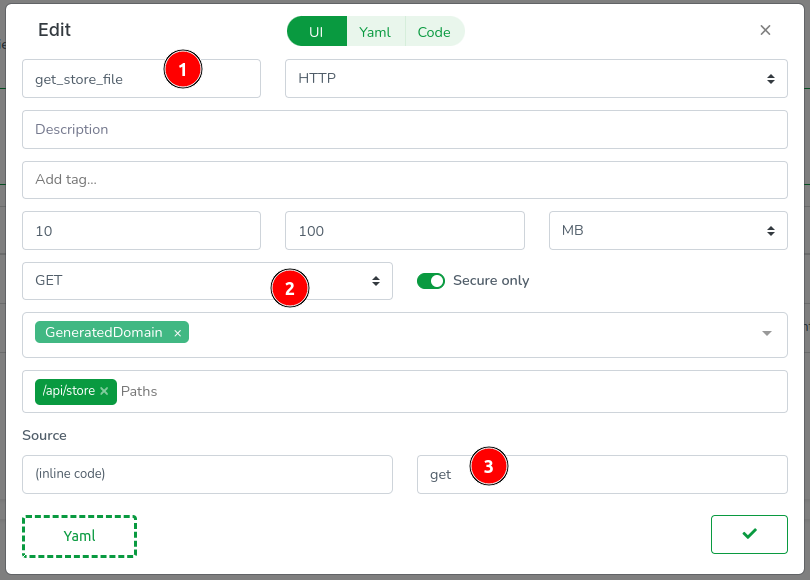
Switch to the code view and add the following code:
package lib
import (
"io"
"github.com/taubyte/go-sdk/event"
http "github.com/taubyte/go-sdk/http/event"
"github.com/taubyte/go-sdk/storage"
)
func failed(h http.Event, err error, code int) uint32 {
h.Write([]byte(err.Error()))
h.Return(code)
return 1
}
//export get
func get(e event.Event) uint32 {
h, err := e.HTTP()
if err != nil {
return 1
}
// Read the filename from the query string
filename, err := h.Query().Get("filename")
if err != nil {
return failed(h, err, 400)
}
// Open/Create the storage
sto, err := storage.New("/simple/storage")
if err != nil {
return failed(h, err, 500)
}
// Select file/object
file := sto.File(filename)
// Get a io.ReadCloser
reader, err := file.GetFile()
if err != nil {
return failed(h, err, 500)
}
defer reader.Close()
// Read from file and write to response
_, err = io.Copy(h, reader)
if err != nil {
return failed(h, err, 500)
}
return 0
}
Trigger the build:
Now, you can test the function by sending a GET request to the endpoint:
The output should be:
Congratulations! You've just created a storage and used it.